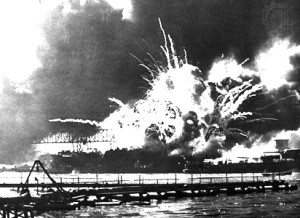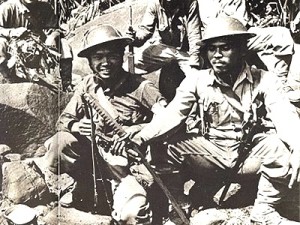Remembering Pearl Harbor and Filipino veterans’ heroism
WASHINGTON, DC — Seventy-five years ago today, Japanese fighter planes bombed Pearl Harbor. On the same day, Japanese forces attacked the Philippines, a U.S. territory at the time.
More than 250,000 Filipino soldiers responded to President Roosevelt’s call-to-arms to defend the Philippines and the United States. They would go on to endure some of the most horrific conditions anywhere in the world, including the Bataan Death March and the ravages of the bombing of Manila, second only to Warsaw in its destruction.
They would not accept defeat. They would not quit. They would not leave a fallen comrade.
Half of them died in battle fighting under the American flag, making the ultimate sacrifice as soldiers in the U.S. Army Forces in the Far East (USAFFE) and as guerrilla fighters during the Japanese occupation of the Philippines. Those who survived suffered the scars of battle and the invisible wounds of war.
They were forced to endure additional humiliation and a slap in the face when the U.S. Congress passed the 1946 Rescission Acts, which stripped them of their rights and promised benefits.
Righting a wrong “This extraordinary moment can only be consoled with the award of the Filipino Veterans of World War II Congressional Gold Medal,” says Maj. Gen. Antonio Taguba (Ret), chairman of the Filipino Veterans Recognition and Education Project.
“Through all this time, the veterans – those who have passed and those still alive today, remained steadfast and resolute hoping our country they had willingly defended would right the wrong brought upon them. Their determination to gain recognition was long and arduous.”
On November 30, Congress finally passed legislation granting recognition to the 260,000 Filipino soldiers for their service and sacrifice. It took more than 72 years.
“The passage of this bill on the eve of the bombing of Pearl Harbor on Dec 7, 1941, and the attack on the Philippines on Dec 8, 1941 is a momentous event, which is now enshrined in U.S. history,” adds Taguba.
“Commemorating the anniversary of ‘the day of infamy’ and the courageous response of Filipino and American soldiers to call to duty, should serve to remind us that their uncommon valor should never be forgotten, that this American story should be preserved for posterity. Always remembering what they did is the best way to protect our children and their children from the horrors of war.”
Today, less than 16,000 remain, most of them ailing and in their 90s.
Global conflict
The Pearl Harbor bombing led to a global conflict. As a Commonwealth of the United States, the Philippines was inevitably drawn into the war. Filipino soldiers fought the Japanese Imperial Forces from December 1941 to December 1946. Thousands were killed, wounded and captured as Prisoners of War. Thousands more fought as guerrillas until the enemy was finally defeated, liberating the country and preserving freedom and democracy in the United States.
“While Americans of all ages remember Pearl Harbor as a key event that triggered our nation’s involvement in World War II, we rightly commemorate the sacrifices of the brave men and women who fought for our freedom in the years that followed,” Taguba points out.
“But much less is known or remembered of the thousands of Filipino and American soldiers who fought bravely for our freedom more than half a century ago and half a world away. Granting them recognition ensures that their story is now a significant part of American history. Honoring and remembering them is the best way to keep their memory alive.”
They are America’s Filipino Soldiers of World War II. They are part of our American story.



